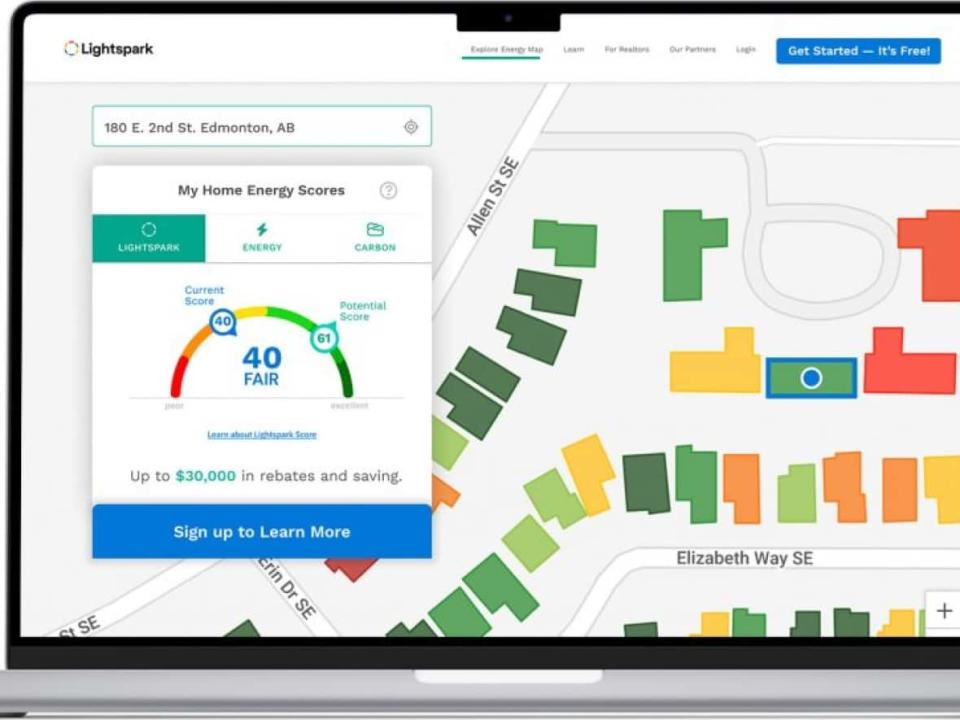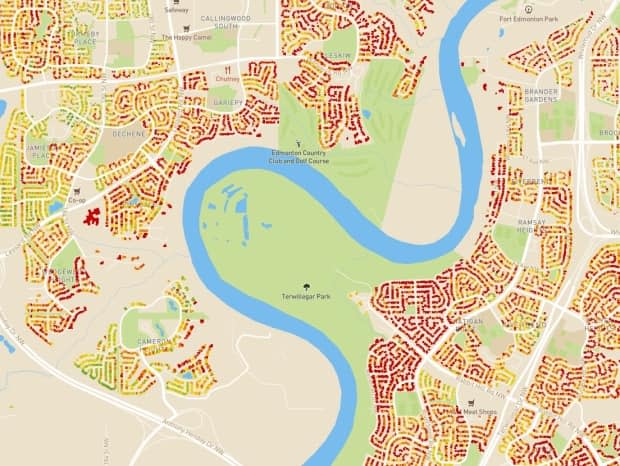New maps estimate energy efficiency for thousands of homes in Edmonton and Calgary

A Vancouver company has used artificial intelligence and machine learning to generate thousands of energy efficiency ratings for single-family homes in Edmonton and Calgary, with the goal of better informing homeowners and prospective homebuyers of inefficient dwellings.
The software company Lightspark published the interactive maps of ratings to its website on Friday. The site's beta version, which will run for 3-6 months as a pilot project, has been years in the making.
Homes estimated to be very efficient appear green on the maps while inefficient ones are red.
Lightspark uses EnerGuide labels, light detection and ranging, property tax rates and census data to estimate energy efficiency. Homeowners can register their properties and enter more information to improve the scores' accuracy.
James Riley, the company's CEO and founder, compared the ratings to vehicle history reports in an interview with CBC News on Wednesday.
"It's really about transparency," he said.
Mike Mellross, program director of the Alberta Ecotrust Foundation, an environmental charity, said both the City of Calgary and the City of Edmonton have indicated there are more than 18,000 dwellings that need to be retrofitted annually by 2050 in order to achieve carbon reduction targets. He said some retrofits are happening, but they're not being done fast enough.
Mellross said the Lightspark maps are a market-based "nudge" tool, designed to help homebuyers and homeowners make better decisions.
"Energy performance of a home really hasn't been included in the decision-making process because there is a slight market failure there in that there's an asymmetry in the information that a buyer and a seller knows," he said.
The Alberta Ecotrust Foundation contributed funding to the project, as did the Alberta Real Estate Foundation and Scotiabank.
Navigating the maps
Clicking on a home on the map brings up three scores: one for energy consumption, one for carbon emissions and one that combines the two and takes into account other houses in the city.
Some areas on Edmonton's map, like the streets just east of Terwillegar Park, are full of red ratings while others, like the newer western neighbourhoods of Secord and Rosenthal, appear mostly green.

The ratings for Magrath Mansion, a century-old home now owned by Concordia University of Edmonton, are listed as "very poor."
Builders question accuracy
CBC News asked two home builders who specialize in net-zero homes to test out the tool. Both questioned the accuracy of its ratings.
"I wouldn't trust this map," said Trevor Hoover, president of Habitat Studio, a custom home builder in Edmonton.
Hoover said the homes he looked up had lower ratings than they should.
He said the rating for a house that belongs to his colleague was too low, but after the colleague signed up with the website and entered his own data, the home's score drastically improved.
Dave Butterwick, the managing partner of Butterwick Projects, said he was experiencing the opposite issue: ratings seemed too high.
"I like the idea of the concept for sure," he said.
Riley said the maps are not perfect yet, but they are being continuously updated. The company is working to take solar panels into account and some homes aren't yet showing up, due to a data glitch.
He said the company aims to have ratings for all single-family homes in both cities within the next week. The company is also working on personalized retrofit recommendations.
Identifying quick fixes
Lightspark isn't the only company to try to estimate energy efficiency at a city scale.
MyHEAT, a competitor based in Calgary, uses aerial thermal imagery to calculate homes' heat loss.
Like Lightspark, it also uses machine learning and assigns ratings to homes.
The company sells its services to governments and utility companies across North America.
The technology has helped identify unexpected sources of energy loss.
Chief revenue officer and co-founder Ian Maddock said the company noticed homes with attached front garages in Calgary seemed to be losing lots of heat. Energy audits confirmed there were poorly insulated walls between the homes and their uninsulated garages.
"A very quick fix," he said.
He said MyHEAT wishes Lightspark all the best with the new maps
"We're collectively competing for reduced energy consumption and emissions, so from that perspective, the more the better," said James Henry, the company's director of growth and sustainability.


